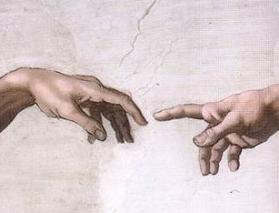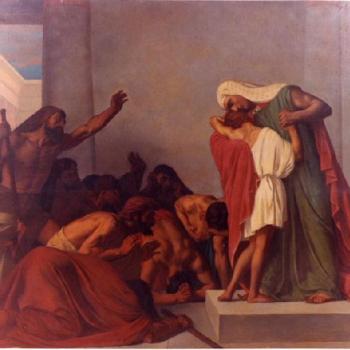This is part of a series of posts on the topic of racialized theology. Start with part 1 and part 2.
Mention was made in my previous post that many people see Black Theology as contextual, but fail to comprehend that all theology is contextual. While I do not share Adolf von Harnack’s view set forth in the History of Dogma that Christian theology or dogma was intellectualized and Hellenized in such a way as to distort or cover the essential gospel, nonetheless, Western theology as historically conceived reflects cultural dimensions and constructs that while critically important for any form of theological reflection do not necessarily have to be embedded verbatim in other cultures’ presentations of the faith. For example, theologians of whatever stripe should account for substantialist categories of the earlier generations of the church (from Patristic times) as essential teachings of the Christian tradition but could and should also make space for other models that complement them, whether they be certain personalist and actualist categories of later Western thought, or communal categories of being from non-Western contexts.
Beyond discussions of Christology and the Trinity, such reflection should extend to such areas as the doctrine of the atonement. For example, the way many conservative theologians approach the doctrine of the atonement, they don’t account for structures of evil as being within the scope of Christ’s atoning work. They so individualize Christ’s atoning work that they fail to show how the atonement addresses structures like racialization (noted in White Theology, Part I). Christ’s atoning work has many facets, and no one doctrine of the atonement such as “penal substitution” or “moral influence” exhausts its import. Christ is changing the world one person at a time, as well as one structure at a time.
While needing to account for various models of the atonement such as penal substitution, moral influence, governmental, satisfaction, among others, Christian theologians must also account for models bearing upon personal and societal suffering, including persecuted minorities and the poor. Jesus was not a middle class white man. He came from peasant stock and cared for the poor (Luke 6:20), and not simply the poor in spirit (Matthew 5:3). As Gordon Fee and Douglas Stuart have argued, we should not take one seriously and ignore the other, but rather account for both of them side by side and in synthetic relation:
In Matthew the poor are “the poor in spirit”; in Luke they are simply “you poor” in contrast to “you that are rich” (6:24). On such points most people tend to have only half a canon. Traditional evangelicals tend to read only “the poor in spirit”; social activists tend to read only “you poor.” We insist that both are canonical. In a truly profound sense the real poor are those who recognize themselves as impoverished before God. But the God of the Bible, who became incarnate in Jesus of Nazareth, is a God who pleads the cause of the oppressed and the disenfranchised. One can scarcely read Luke’s gospel without recognizing his interest in this aspect of the divine revelation (see 14:12–14; cf. 12:33–34 with the Matthean parallel, 6:19–21) (Gordon Fee and Douglas Stuart, How to Read the Bible for All Its Worth, 2nd ed. [Grand Rapids: Zondervan], 125).
We must account for categories of oppression, and not simply personal guilt and existential alienation, as important as these categories are. Jesus is surely our righteous substitute for the payment of the penalty of personal sin as well as our victor over personal suffering and large scale oppression. No doubt, we need various theological voices from various backgrounds and traditions to bring the multi-faceted mystery of the atonement to bear on the fullness of life. In view of the need to hear from various voices, consider what James Cone, a leading African American theologian, says about the significance of the cross for African Americans. During an interview titled “Theologians and White Supremacy,” Cone says:
The cross stands at the center of the Christian faith of African-Americans because Jesus’ suffering was similar to their American experience. Just as Jesus Christ was crucified, so were blacks lynched. In the American experience, the cross is the lynching tree. The crucifixion of Jesus was a first-century lynching. If American Christians want to understand the meaning of the cross, they have to view it through the image of the lynching tree on which approximately 5,000 mostly (but not exclusively) black people were killed.
My theology is so limited, not because of the Bible, which is so vast in its rich complexity and mystery wedded to the pure simplicity of God’s holy love, but because of my experience and failure to engage people of various backgrounds and stripes in their pain. It is very hard for me to understand what Jesus as the Savior of the world of Luke’s Gospel means to someone living under oppression here in the States in a system that caters to white privilege (theology shaped by white privilege and that does not account for oppression but even promotes it in some manner, whether imposed by whites or people of other hues, is also to be accounted for in speaking of “white theology”). It is also difficult for me to comprehend what Jesus means to hungry children in Latin American ghettos or depressed communities in the States when I have never gone a day without food. In some ways, for the same reasons, it is very hard for me to understand what Jesus in Luke’s Gospel means for me today.
Theology must account not simply for penal substitution or St. Anselm’s satisfaction theory, but also Cone’s emphasis on victimization, among other atonement perspectives, if we are to move beyond singular adherence to “white theology” and cultivate a truly multi-colored theology so as to bring the biblical message home today in a satisfactory manner.
What might a truly multi-colored theology look like TODAY?
As a white theologian concerned for cultivating a truly multi-colored theology, I need to share in the sense of vulnerability many African Americans as well as others feel about three recent events in our nation.
As I said above, I have never gone a day without food. However, many in America today do know what living without food feels like. In view of the reality that race and class often track one another in America, how do we develop a multi-colored theology that addresses the fear of scarcity among the well to do in view of God’s abundance in Christ and make sure that the elimination of food stamps (SNAP) is eliminated? Food stamps should be made available for those who not only fear scarcity but live it.
The reframing of the Voting Rights Act to make the individual states responsible for overseeing voting procedures has led many to fear the return of Jim Crow era policies as it pertains to voting. In view of the God who counts the hairs on everyone’s head and takes everyone seriously no matter their pedigree and delights in the richness of ethnic diversity, how do we ensure that every vote is counted as we pursue equity? The church from the local to national levels must advocate for justice and equity for all. Christians also have a responsibility to hold accountable our leaders in our democratic system: our elected officials must remain diligent so that Jim Crow policies do not return but simply remain a terrible scar from a deep wound from our democracy’s past.
The verdict of the George Zimmerman trial has been echoing through courts of justice and across the land. What is to take away the fears of many in the African American community that there is nothing wrong with shooting and killing an unarmed black youth as long as one can demonstrate that one had reason to fear for one’s life? But what about the young black life that did not simply fear violence but was also extinguished as a result of someone else’s fear? It will not do to try and alter the conversation and speak only about black on black violence. It could very well be the case that black on black violence is itself in part the result of the violence against the African American community since its ancestors’ forced arrival on American shores centuries ago. We need to develop a theology of life that brings to an end a culture of violence and death across the board in view of Jesus who swallowed up death and violence in his once-for-all sacrifice and in his resurrection from the dead.
Instead of pointing the finger at this or that community, we need to hold hands and candles and pens together in an ongoing vigil of prayerful theology that leads to the development of a multi-colored life of just love that extinguishes scarcity, inequity and violence in our day. Will you and I join hands together to this end?
This piece is cross-posted at The Institute for the Theology of Culture: New Wine, New Wineskins and at The Christian Post.
















